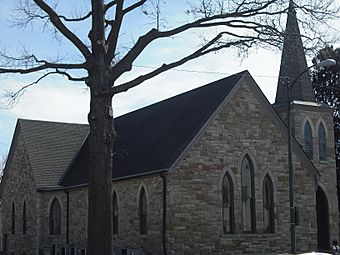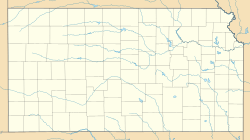English Lutheran Church facts for kids
Quick facts for kids |
|
|
English Lutheran Church
|
|
 |
|
| Location | 1040 New Hampshire St., Lawrence, Kansas |
|---|---|
| Area | less than one acre |
| Built | c.1870, 1900, 1936, 1941, 1992-1993 |
| Architect | Haskell, John G.; Lescher, William |
| Architectural style | Late Gothic Revival |
| NRHP reference No. | 95000945 |
| Added to NRHP | July 28, 1995 |
The English Lutheran Church is a very old and important building located at 1040 New Hampshire Street in Lawrence, Kansas. It was first built around 1870 and then made bigger in 1900. This historic church was added to the National Register of Historic Places in 1995. This means it is recognized as a special place worth protecting because of its history and architecture.
The church is a two-story building made from rough-cut limestone. It sits on a strong foundation also made of limestone blocks. The building is about 46 feet wide and 78 feet long.
Contents
A Special Place in Lawrence
The English Lutheran Church is more than just an old building. It is a reminder of the past that still helps shape the city today. Cathy Ambler, who was the Chair of the Historic Resources Commission, once said that old buildings like this church should be valued. She believed they contribute to history and can also be useful for the future. This shows how important it is to keep and care for historic places.
The Church's Design and Builder
The church was built in a style called Gothic Revival architecture. This style often includes pointed arches, tall windows, and detailed stone work. It was designed in 1870 by a famous Kansas architect named John G. Haskell. He designed many well-known buildings in Lawrence. He also designed the Douglas County Courthouse and parts of the Kansas State Capitol building.
Saving a Historic Building
For a while, there was a plan to tear down the English Lutheran Church. However, many people wanted to save it. After a long legal disagreement that lasted four years, the building was bought by a group called Ashlar LC. They worked with the Lawrence Historic Preservation Alliance and the Kansas State Historical Society to save it.
The building was carefully fixed up and changed to be used as modern office spaces. This process is called rehabilitation. On November 6, 1993, the Governor of Kansas at the time, Joan Finney, held a special ceremony to celebrate the building's new life. Just two years later, in 1995, the church was officially placed on the National Historic Register. The building right next to the old church was once the original home for the church's minister, known as the parsonage.
References



